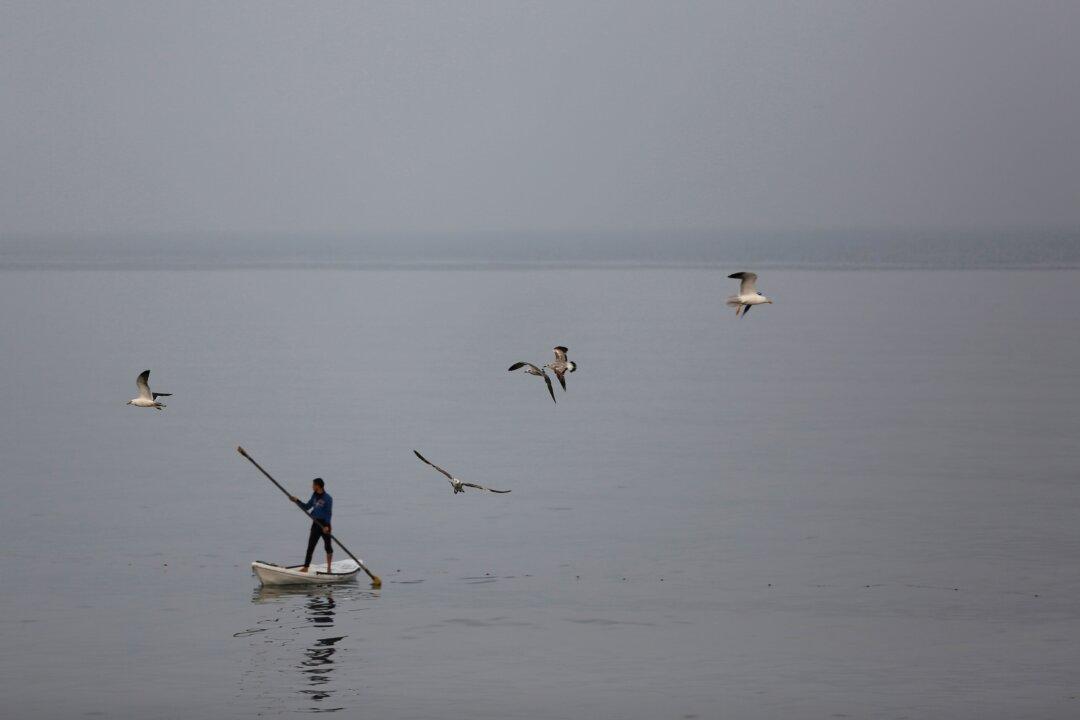JERUSALEM—Egypt has denied reports that it is negotiating maritime borders with the Palestinian Authority. The denial comes on the heels of a very specific, public declaration made recently by a senior Palestinian government official to that end.
Last week, Riyad Mansour, the Palestinian ambassador to the U.N., told several reporters that the Palestinian Authority (PA) is in the early stages of negotiations with Egypt to establish a sea border.
Mansour was speaking at the outset of a week of meetings at the U.N. Convention on the Law of the Sea that ended on June 20.
On June 19, Egypt said there are no negotiations, secret or otherwise, regarding sea borders with the Palestinian Authority.
In an exclusive interview with the Turkish media outlet Anadolu Agency, Egyptian Foreign Ministry spokesman Ahmed Abu Zeid said the reports were “unfounded.”
“There is no Egyptian position regarding maritime border demarcation with Palestine,” he told the news agency. In Middle Eastern shorthand, Egypt’s denial of plans to establish border demarcation lines could simply be a smokescreen against potential fallout in the court of public opinion.
The Egyptian government suffered a public backlash when they made a deal with Saudi Arabia in April over another maritime border demarcation. That agreement entailed Cairo giving up sovereignty of two islands in the Red Sea to Saudi Arabia.
The deal was publicly branded as a blatant sellout of sovereign territory to a foreign government by Egyptian president Abdel-Fattah al-Sisi. An Egyptian court on June 21 rejected as “unconstitutional” a border agreement that would have transferred two Red Sea islands to Saudi Arabia, and that sparked street protests in Cairo.
Saudi Arabia has been a solid backer of al-Sisi’s regime ever since he rose to power in a 2013 military coup that ousted Egypt’s first democratically elected president.
The undersea border announcement is not the first time that the PA has tried to use the U.N., where it has had non-member observer status since 2012, as a tactic to legitimize itself as a sovereign state. Of the various U.N. committees the PA is part of, it has shown special attention to involvement in the law-of-the-sea convention.
Israel is not a party to the Convention on the Law of the Sea.
Land under the control of the PA has an extremely complex governmental status domestically and internationally. It is not officially a state, though it has a functioning government in the West Bank, whose territory is akin to a map of Swiss cheese, over which the Israeli government exercises more than 60 percent control.
A land border between Israel and the Palestinians is one of the key issues in a potential peace agreement and two-state solution. Israel’s U.N. Ambassador Danny Danon described Palestinian attempts to define an undersea boundary as a way to dodge the peace process.
“This ... does not bring any stability to our region and, more importantly, will not better the life of a single Palestinian,” said Dayan.
The PA’s representative at the U.N., Mansour, told the media that meetings of the Palestinian and Egyptian foreign ministries have already taken place. The next step, if discussions are truly taking place, is technical team discussions.
Another complication for the PA is the tide of events with Egypt over the past few years. The Arab Center for Research and Policy Studies, an independent research institute and think tank, has extensively analyzed the PA’s extraordinarily complicated relationship with Cairo.
In 2014, the PA’s government initiated reconciliation talks with Hamas in Gaza to create one unified government entity. The talks have since stalled three times, most recently in the past week.
The hostility of the coup government in Egypt toward Hamas, according to the Arab Center, has also created a major stumbling block for reconciliation talks. Such negotiations typically require a “sponsor” government for support. Prior to 2014, a natural sponsor would have been Egypt.
The economy in Gaza suffered severely after al-Sisi took power the same year. Since then, 90 percent of Hamas’ illegal underground tunnels that led to the Sinai have been destroyed by Egypt.
The peace process with Israel has also suffered since 2014. The PA has said that it would stop trying to use the U.N. as leverage over Israel if certain conditions for peace negotiations were met. Those negotiations are still stalled despite a recent French initiative.
If the Palestinians were able to establish undersea territory, it would be a step toward creating sea borders and laying claim to natural resources. Other undersea resources in the region have yielded massive natural gas deposits. Those offshore gas deposits have become increasingly important in regional politics.
The massive Leviathan gas field in the Mediterranean is considered one of the most important potential tools in establishing Israel as a global powerhouse. A second smaller deposit, the Tamar gas field, is not far away.
In 2014, the Israel Electric Corporation said that an undersea gas field off the coast of Gaza contains about 33 billion cubic meters of natural gas. Dubbed Marine Gaza, the deposit is about 60 percent owned by the British, and could provide energy resources to Israel for five years or to Gaza for 25 years.
Though it is highly unpredictable whether there will be any discoveries of additional regional gas deposits, the PA’s attempt to establish underwater territory in the Red Sea could lead to valuable economic resources if gas deposits are discovered.
Mansour has described the area as the “wealth of the Palestinian people.”
“For those who keep denying that we exist, we want to show them in a peaceful, legal, smart, realistic way that this state is growing, and it’s growing in a responsible way, and it is also defending the rights of our people in accordance with international law,” said Mansour last week.
The Associated Press contributed to this report.




